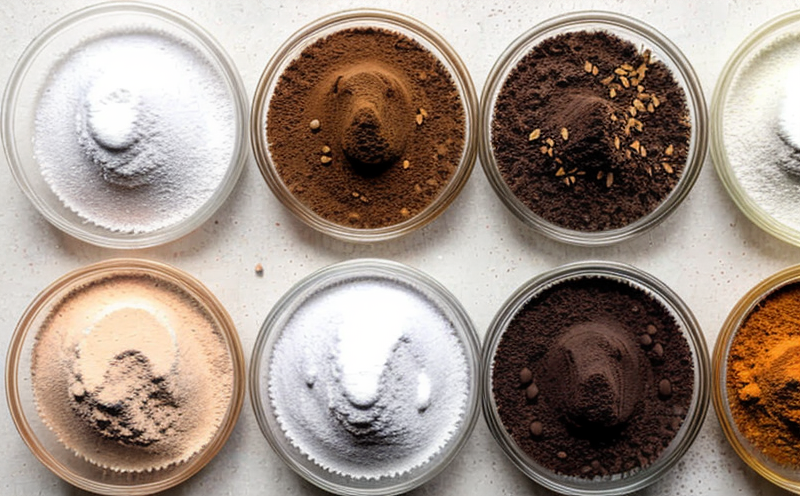EN 19075 Carmine Residue Testing in Confectionery
The European Standard EN 19075 specifies methods for determining the presence and content of carmine residue, a natural food coloring derived from the cochineal insect, in confectionery products. Compliance with this standard is crucial for ensuring that confectionery producers meet regulatory requirements regarding the use of natural colorants.
Given the increasing global demand for natural ingredients over synthetic ones, many manufacturers opt to incorporate carmine into their products. However, its presence must be accurately measured and reported to avoid non-compliance issues with various jurisdictions worldwide. This service ensures that confectionery companies can reliably test for carmine residues in their products using standardized methods.
The testing process involves sampling the confectionery product according to defined procedures outlined within EN 19075, followed by extraction and analysis of the sample to quantify any detected carmines. This detailed approach guarantees accurate results that are both precise and reproducible—a critical aspect when dealing with food safety standards.
Our laboratory adheres strictly to this standard during every stage of testing, ensuring that clients receive trustworthy data which can be used for regulatory submissions or internal quality control purposes. By leveraging our expertise in analyzing carmine residues, we help companies maintain high standards of product integrity and consumer confidence.
The importance of proper carmine residue detection cannot be overstated; it plays a vital role in maintaining compliance with international regulations such as those set forth by the European Commission (EC) and the Food and Drug Administration (FDA). Additionally, this service supports efforts towards sustainability initiatives by promoting the use of natural ingredients where possible.
For more information about our EN 19075 Carmine Residue Testing services or to discuss how we can assist your organization, please contact us directly. Our experienced team is ready to provide tailored solutions designed specifically for your needs.
International Acceptance and Recognition
- Countries Recognizing EN 19075: The European Union (EU), United Kingdom (UK), Switzerland, Norway, and other countries adhering to EU regulations.
- Regulatory Bodies: EC Regulation No. 1333/2008 on food additives, flavors, and processing aids, which mandates compliance with EN standards for certain applications.
The European Standard EN 19075 enjoys widespread acceptance across Europe due to its stringent quality assurance measures and rigorous validation procedures. Its recognition extends beyond geographical boundaries, making it a globally respected benchmark for assessing carmine content in confectionery products.
Compliance with this standard not only ensures adherence to legal requirements but also enhances brand reputation by demonstrating commitment to responsible sourcing practices. Companies adopting these stringent testing protocols can gain competitive advantages in markets where consumers are increasingly demanding transparency regarding the origin and composition of food ingredients.
Competitive Advantage and Market Impact
By implementing our EN 19075 Carmine Residue Testing service, companies within the confectionery industry can secure a significant competitive edge. Accurate measurement of carmine residues ensures that products meet strict regulatory standards, thereby reducing the risk of legal challenges or recalls.
The ability to demonstrate compliance with internationally recognized norms also fosters trust among consumers who are becoming more discerning about the ingredients used in their food choices. This transparency can lead to enhanced brand loyalty and increased market share as customers gravitate towards brands perceived as leaders in ethical business practices.
Moreover, by staying ahead of regulatory changes through consistent testing procedures aligned with EN 19075, businesses demonstrate foresight and adaptability—a crucial trait in today’s rapidly evolving food industry landscape. Such proactive measures can help companies navigate complex market environments characterized by fluctuating consumer preferences and ever-changing legislation.
In summary, adopting our EN 19075 Carmine Residue Testing service enables confectionery manufacturers to build strong reputations based on reliability and integrity. This commitment to quality control contributes directly to long-term success in both domestic and international markets.
Use Cases and Application Examples
- Regulatory Compliance: Ensuring that carmine content does not exceed allowable limits as specified by relevant regulatory bodies like EC Regulation No. 1333/2008.
- Sustainability Initiatives: Supporting companies committed to reducing reliance on synthetic colorants and promoting the use of natural alternatives in their products.
In practice, our EN 19075 Carmine Residue Testing service is utilized by various entities including large-scale confectionery producers, small-to-medium enterprises (SMEs), and research institutions. These organizations rely on accurate testing results to make informed decisions about ingredient sourcing and formulation adjustments.
For example, a major chocolate manufacturer may use our services during the development phase of new product lines aimed at capturing niche markets demanding ethically sourced ingredients. Similarly, an SME focused on artisanal candies might utilize these tests as part of its internal quality assurance program to ensure consistency across batches produced for local distribution.
Research institutes conducting studies related to food safety and nutrition can also benefit from our expertise in this area by gaining access to reliable data that supports their academic inquiries. Overall, the versatility of our testing methodologies allows us to cater effectively to diverse client needs within the confectionery sector.





